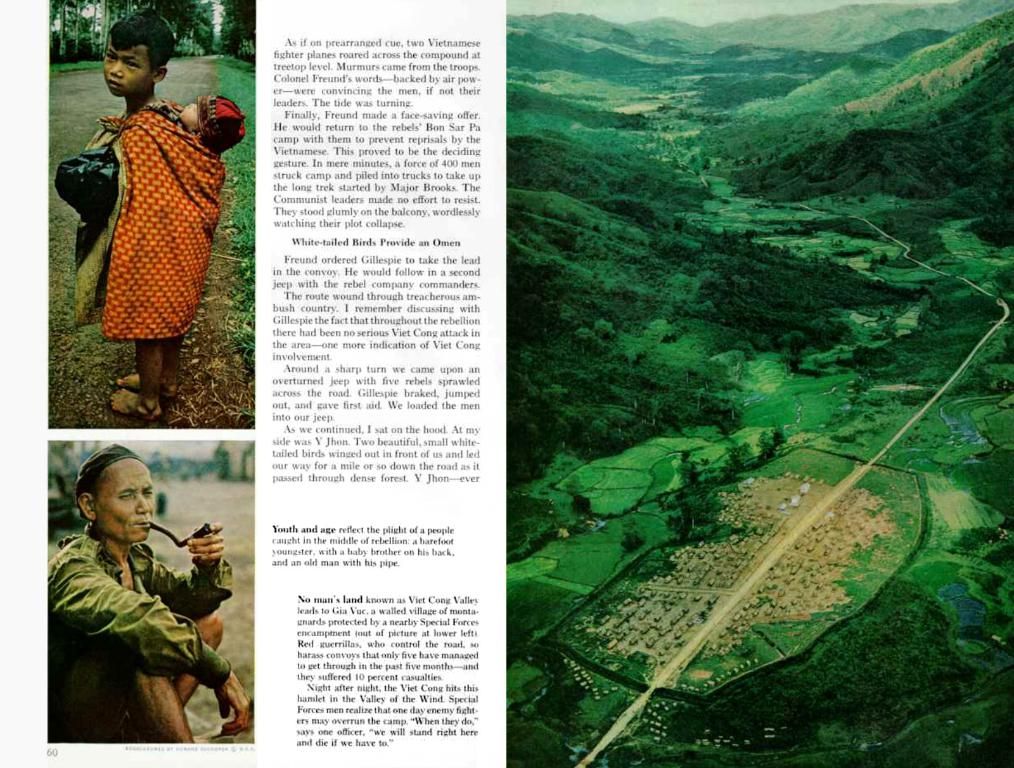Arrests of Journalists in Azerbaijan Spark Criticism
Azerbaijan's defiant stance towards Western criticisms amidst a media clampdown complicates its ambitions to escalate energy exports and trade through the Middle Corridor. The authoritarian government's latest move against Toplum TV adds fuel to the fire, stirring controversy and garnering international condemnation.
The recent crackdown on free press began on March 6 with the apprehension of Toplum TV employees, followed by additional arrests three days later. Such arrests coincided with a German television network ARD airing a documentary alleging Azerbaijan's infiltration into European and German politics. The documentary featured Toplum TV's chief editor, Khadija Ismail, discussing Azerbaijan's allegedly corrupt practices and media suppression.
Toplum TV employees who remained free denounced the arrests as politically motivated and vowed to continue producing news[6]. International watchdog groups and governmental agencies voiced their concerns, with Amnesty International categorically stating that "Azerbaijani authorities must immediately end the growing crackdown on human rights and independent media"[7].
Azerbaijan, however, remains unperturbed. Internal commentaries in state-affiliated media outlets have been deafening, urging Western criticism to quiet down. One outlet went as far as accusing Azerbaijan and the West of conducting an "information war," with Toplum TV and other independent media acting as the adversary[8].
Such heavy-handed suppression of dissent reflects a broader strategy to control the narrative and eliminate opposition, a move that has garnered significant criticism from international organizations due to the ensuing human rights abuses[1][2][4].
Azerbaijan's pivotal role in the Middle Corridor—part of the New Silk Road—makes it an integral players in the region. The West desires to tap into more Caspian Basin oil and natural gas exports, aiming to reduce dependency on Russian energy[9]. The US and EU have secured agreements with Azerbaijani officials to expand three pipelines linking Azerbaijan to Europe[9].
Moreover, Azerbaijan serves as a key node in new trade routes bypassing Russia, which the US and EU are increasingly interested in developing. However, the media crackdown and human rights issues pose a significant challenge to Western diplomacy and may jeopardize the multifaceted relationship[10].
Ultimately, Azerbaijan is betting on its strategic resources outweighing the fundamental principles underlying Western democracy. The West, on the other hand, faces the daunting task of balancing its strategic interests with pressure on Azerbaijan to uphold media freedoms and human rights.
[1] "Freedom in the World 2021: Azerbaijan" (Freedom House, 2021). https://freedomhouse.org/report/freedom-world/2021/azarbaijan[2] "World Report 2021: Azerbaijan" (Human Rights Watch, 2021). https://www.hrw.org/world-report/2021/country-chapters/azerbaijan[3] "Azerbaijan: Media under pressure" (Amnesty International, 2021). https://www.amnesty.org/en/latest/news/2021/02/azerbaijan-media-under-pressure/[4] "Azerbaijan: Freedom of the Press and Open Internet" (Freedom House, 2021). https://freedomhouse.org/report/freedom-media/2021/azerbaijan[5] "Azerbaijan: Journalists Jailed for Reporting on Corruption" (Human Rights Watch, 2021). https://www.hrw.org/news/2021/03/09/azerbaijan-journalists-jailed-reporting-corruption[6] "Statement by the Employees of Toplum TV" (Reporters Without Borders, 2021). https://rsf.org/en/news/statement-employees-toplum-tv[7] "Azerbaijani authorities must immediately end the growing crackdown on human rights and independent media" (Amnesty International, 2021). https://www.amnesty.org/en/latest/news/2021/03/azerbaijani-authorities-must-immediately-end-the-growing-crackdown-on-human-rights-and-independent-media/[8] "Azerbaijan Media: Crackdown on Independent Outlets" (Radio Free Europe/Radio Liberty, 2021). https://www.rferl.org/a/azerbaijan-media-crackdown-on-independent-outlets/31039689.html[9] "Azerbaijani Energy Minister talks energy exports to US" (Trend News Agency, 2021). https://en.trend.az/azerbaijan/politics/3410664.html[10] "Azerbaijan's Middle Corridor: Balancing Geopolitical Interests with Democratic Values" (The Jamestown Foundation, 2021). https://jamestown.org/program/azerbaijans-middle-corridor-balancing-geopolitical-interests-with-democratic-values/
- The arrests of Toplum TV employees and the ensuing controversy over the crackdown on free press have raised concerns within the realm of 'politics' and 'policy-and-legislation', as international organizations such as Amnesty International have called for an end to human rights abuses.
- The allegations of Azerbaijan's corrupt practices and media suppression, as discussed in the ARD documentary featuring Toplum TV's chief editor, Khadija Ismail, have cast a shadow over the 'general-news' and 'crime-and-justice' landscapes, sparking international condemnation.
- As the media crackdown continues, Azerbaijan's stance towards Western criticisms could potentially impact its position in the 'energy' industry, particularly in the 'oil-and-gas' sector, given its role in the Middle Corridor and the West's interest in Caspian Basin exports.
- The West's strategic interests in the 'oil-and-gas' industry and the development of new trade routes bypassing Russia are at odds with the principles of 'democracy' and 'human rights', creating a complex situation that requires a delicate 'diplomacy'.
- The escalating 'war-and-conflicts' or 'information war' allegations between Azerbaijan and the West, as portrayed in state-affiliated media outlets, further complicate the already tense relationship, making it more challenging for the West to balance its strategic interests with the upholding of media freedoms and human rights.








